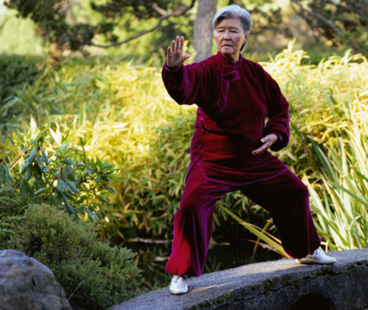The numbers are, well, depressing; more than two million Americans ages 65+ suffer from depression. And in the next 35 years, twice as many people will find themselves in that age bracket—including me, and probably you too!
So, what activities can ward off as we get older?
Researchers at UCLA turned to a gentle “Westernized” version of tai chi, the 2,000-year-old Chinese martial art. When a group of adults over age 60 and on antidepressant drug therapy attended a weekly tai chi exercise class, standard rating scales showed greater improvement in their level of depression—along with improved quality of life, better memory and cognition, and more overall energy—when compared to study participants taking the same medicine but going to a weekly health education class.
Results of the study appear in the online edition of the American Journal of Geriatric Psychiatry.
“This is the first study to demonstrate the benefits of tai chi in the management of late-life depression, and we were encouraged by the results,” said first author Dr. Helen Lavretsky, a UCLA professor-in-residence of psychiatry. “We know that nearly two-thirds of elderly patients who seek treatment for their depression fail to achieve relief with a prescribed medication.”
In the study, 112 adults age 60 or older with major depression were treated with the prescription antidepressant escitalopram (brand name: Lexapro) for approximately four weeks. From among those participants, 73 who showed only partial improvement continued to receive the daily medication but were also randomly assigned to 10 weeks of either a tai chi class or a health education class for two hours per week.
Both groups showed improvement in the severity of depression, said Lavretsky, who directs the UCLA Late-Life Depression, Stress and Wellness Research Program, but greater benefits were noted among those participating in tai chi.
“This study shows that adding a mind-body exercise like tai chi that is widely available in the community can improve the outcomes of treating depression in older adults. With tai chi, we may be able to treat other, coexisting medical conditions without exposing them to additional medications.”
If it’s good enough for grandma, it’s good enough for me.
Finding a gentle tai chi class, however, can take some detective work. Contact your health care provider, YMCA, and community wellness centers. Check with friends too—the best referral is always based on firsthand experience. DVDs and online videos are available, but a supervised program seems best.
Know a good facility or instructor offering a low-key form of tai chi? Post it here!
Become a Saturday Evening Post member and enjoy unlimited access. Subscribe now




Comments
The majority of older adults with depression improve when they receive treatment with an antidepressant,
psychotherapy, or a combination of both. They create stress,
emptiness, avoidance of being in touch with your own authenticity, and narrow ways of dealing with life’s challenges. In cases of mild depression medicines show a good recovery in the patient.
Tai Chi has helped me quite a lot in coping with depression.My local senior citizen center,sponsored by Salt Lake County,provides a terrific instructor.Even though I struggle to remember the sequence of the excercises,we have a lot of fun in addition to keeping mentally and physically fit.